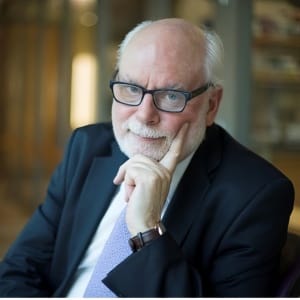

The Royal Society of New South Wales was saddened to learn of the death, in Australia, of Distinguished Fellow Professor Sir Fraser Stoddart FRS DistFRSN FAA FRSE FRSC. Sir Fraser was 82 and was still active in research and teaching around the world until recently before his death on 30 December 2024.
Known for a share the 2016 Nobel Prize in Chemistry “for the design and synthesis of molecular machines,” Sir Fraser was considered a pioneer in ‘artificial molecular machines’: molecules that can undergo simple mechanical motion and thereby have the potential to do work on the smallest of scales. Sir Fraser dubbed his approach ‘molecular Meccano’.
In 2017 Sir Fraser joined UNSW, Sydney to realise his “New Chemistry” initiative. Visiting each year, Sir Fraser gave lectures to faculty and students and collaborated on a range of exciting chemistry projects involving the manipulation of molecules to effect devices such as switches, sensors and motors.
In addition to the Nobel Prize, Sir Fraser has been awarded many prizes and fellowships including a Humboldt Fellowship (1998), the King Faisal Prize in Science (2007), the Albert Einstein World Award of Science (2007), Honorary Fellow of the Royal Society of Edinburgh (2008), Davy Medal of the Royal Society (2008) and membership of the National Academy of Sciences (USA, 2014).
Two former students (of 300 PhD and post-doctoral researchers), Albert Fahrenbach and Dong Jun Kim, have positions in the School of Chemistry UNSW and write: “He was a role model in every sense – someone who inspired others not just through his achievements but through the way he lived, worked, and encouraged those around him to strive for excellence. He was generous as much as he was hard-working and visionary, and the impact he made on people’s lives will be passed on for generations.”
Numerous obituaries, including those on the following websites—BBC, Royal Society of Chemistry, Washington Post, and the South China Morning Post—have appeared since his death.